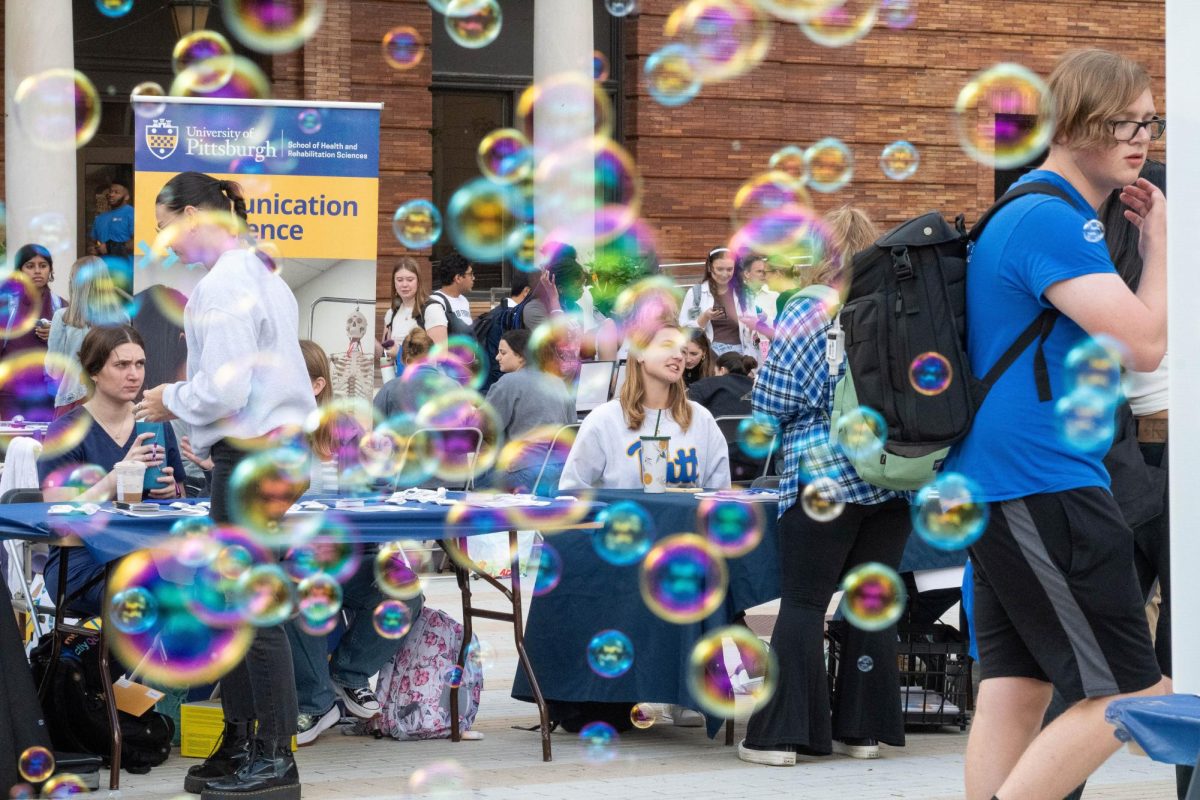The life adjustments that come with the transition to college can manifest into disordered eating, according to Katie Armstrong.
“Manipulating your food or changing your diet is sometimes a way to cope with all the changes and things that are happening, and it can get really serious really quickly,” Armstrong, senior professional relations specialist for the Emily Program, said. “When you’re not feeding yourself, you’re not thinking clearly. You get stomach aches, it’s hard to think, you get lightheaded, and it could be a physical problem, so we’re here to help.”
The Panther Wellness Fair took place on Wednesday, Sept. 13 from 10 a.m. to 2 p.m. outside of the William Pitt Union. The event featured a variety of booths with resources geared toward the health, wellness and safety of the Pitt community, as well as visits from therapy dogs and free flu shots with student ID.
One of the booths featured representatives from the Emily Program, which treats eating disorders in people of all ages, genders and diagnoses, according to Armstrong. She said the Emily Program’s website presents a plethora of information about eating disorder treatment, including screening tools and information about free online and in-person resources.
Visiting with the therapy dogs from Pitt’s Therapy Dog Tuesday program at the fair reminded Karina Feindt, a first-year computational social sciences major, of her pet at home.
“I’m from just outside of Philadelphia, so my dog is very far away,” Feindt said. “It’s definitely difficult having to leave her, and so I feel like [the dogs] give such comforting interactions. I’m not able to go to the Tuesday night sessions, so this is very good to have.”
Students could also visit the Planned Parenthood Generation Action booth, an on-campus organization that educates students about the different reproductive health and gender-affirming care resources available to them. Julia Falgione, a representative for the organization, said Planned Parenthood Generation Action works closely with Planned Parenthood of downtown Pittsburgh and Allegheny Reproductive Health Center — two local reproductive health organizations that offer abortion services.
“We are super lucky to be able to work with the downtown clinic office,” Falgione said. “We [also] like to connect students with volunteer opportunities and just have fun meetings and educate about things like birth control, LGBTQ+ history, anything that we can do.”
The Pitt Pantry, a campus food bank located in the O’Hara Student Center Kitchen that serves Pitt students, faculty and staff, also had a booth at the fair. According to representative Sally Margalitachvili, The Pitt Pantry gives out canned food, fresh fruits and vegetables, milk, eggs and meat, as well as donations from Panera Bread, to students up to twice a month.
Margalitachvili said the program partners with Food Recovery Heroes and the Eatery to package leftover food into microwave-ready meals. It also takes into account dietary restrictions, featuring Halal, vegan and vegetarian options.
Student Health Services, which provides primary health care, prevention, health education and pharmacy services to students, administered free flu shots with student ID at the fair. Student Health Services, located in the Wellness Center in the lobby of Nordenberg Hall, is open from 9 a.m. to 5 p.m. Monday through Friday and 10 a.m. to 3 p.m. on Saturdays.
The University Counseling Center, who also had a booth at the fair, offers free, confidential clinical services for all Pitt students, such as Individual and Group Counseling and Crisis Response Services, according to their website. Drop-in hours are available Monday through Friday, 9 a.m. to 4 p.m. Those wishing to utilize services can call 412-648-7930 or walk in.
Another important resource offered to students at the fair was the Stress Free Zone. The SFZ offers “relaxation stations” intended for stress reduction, as well as meditation and yoga classes. The SFZ hosts therapy dogs Mondays from 11:30 a.m. to 12:30 p.m. and is located on the third floor of the William Pitt Union. It is open Monday through Thursday from 11 a.m. to 8 p.m., and Friday from 11 a.m. to 3 p.m.
While most organizations offered health and wellness resources at the fair, a few groups presented information about opportunities to participate in research to better understand the community. One of the opportunities was with the Sleep, Affective Neuroscience and Development Lab, which is currently conducting three separate studies that students have the opportunity to participate in.
One of the studies will examine bipolar disorder. Participants will be given a watch to measure mood activity in the home setting for a couple of weeks, and will then visit the lab Thursday and Sunday night of the final week to stay overnight for testing, according to a representative at the booth.
Another study will examine how jet lag and “light conditions” affect 24-hour sleep cycles. This study will include three nights in the lab and the same at-home tracking as the first study.
The final study will conduct tests to study the effects of bright light on mood and circadian function, with at-home tracking and one overnight stay in the lab.
Another integral resource presented to students at the fair was Study Lab, an on-campus tutoring service that provides resources to help students understand material and develop proper studying strategies. Peer or staff tutoring appointments are available Monday through Friday, both in-person and virtually.



